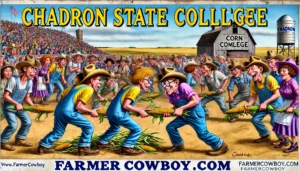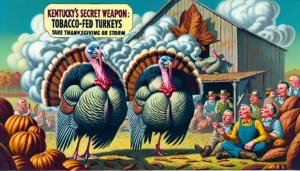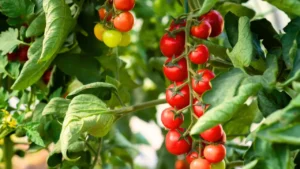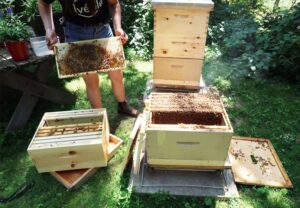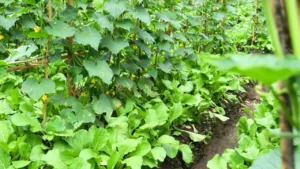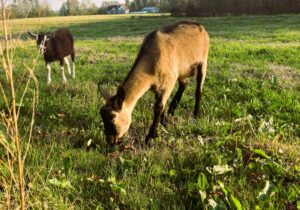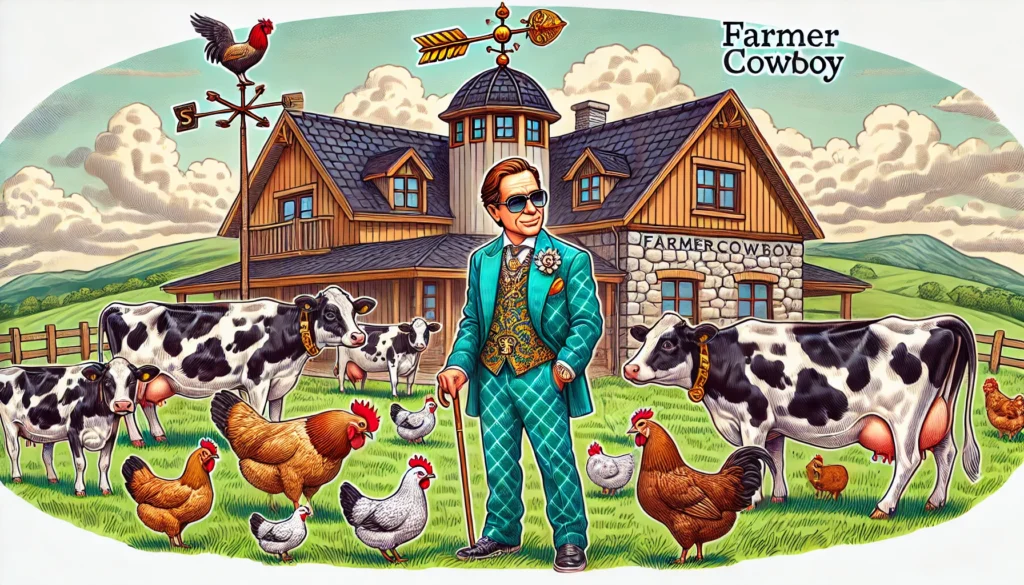
Why Are the Ultra Rich Buying Farmland A humorous vivid and detailed illustration of a billionaire in a designer suit standing in front of a traditional farmhouse surrounded by cows and c4.webp.webp
Why Are Billionaires Buying Farmland? The Truth Will Plow You Away!
“From boardrooms to barnyards, why the ultra-rich are swapping suits for overalls and tractors!”
Green Acres, USA — In a world where the ultra-rich have already bought everything from private islands to trips to space, there’s a new frontier in their acquisition spree: farmland. Yes, that’s right. The billionaires who once ruled the tech and finance sectors are now trading in their tailored suits for overalls and straw hats. But why? What’s driving this sudden fascination with dirt, tractors, and the sweet smell of manure? We set out to uncover the truth behind this surprising trend.
Corn-stalk Market: The ultra-rich are trading stocks for stalks. After all, corn futures have never looked so golden.
From Boardrooms to Barnyards: The Rich Get Down to Earth
It turns out that after years of buying up luxury real estate, sports teams, and even space travel companies, the ultra-rich have finally realized that there’s only so much you can do with a penthouse view. Now, they’re turning their attention to the pastoral charm of farmland. Why lounge by the pool when you can plant crops, raise livestock, and experience the thrill of worrying about the weather?
Take billionaire investor Warren Wheatley, who recently purchased a 1,000-acre farm in Iowa. “I’ve conquered Wall Street, so now I’m taking on wheat fields,” he says with a grin. “It’s about diversification—both in my portfolio and my lifestyle. Plus, I get to say things like ‘My crop yield was excellent this year,’ and that’s just fun.”

The Farm-Tastic Investment Opportunity
It’s not just about the charm of rural life, though. Farmland is actually a solid investment. With global food demand on the rise and the volatility of traditional markets, farmland offers a stable, tangible asset that can yield both financial and literal fruits (or vegetables). Experts predict that the value of farmland will continue to increase, making it the perfect addition to any billionaire’s portfolio.
According to agricultural analyst Cornelia Cashcrop, “Farmland has become the new gold. It’s not just about the potential returns; it’s about owning something real, something that contributes to society. The ultra-rich are finally realizing that they can’t eat their stocks and bonds—but they can eat what they grow on their farms.”
And it’s not just about the crops. Livestock is also a hot commodity. Cattle, pigs, chickens—they’re all part of the ultra-rich’s newfound love for agriculture. After all, what’s more satisfying than knowing that your hamburger came from your very own herd of cows?
Eye-Witness Testimonies: The New Farmer Billionaires
We visited Green Acres, USA, to see firsthand how the ultra-rich are adjusting to their new lives as farmers. And let’s just say, it’s been an interesting transition.
One local farmer, Joe “Cornbread” Johnson, shared his thoughts. “I never thought I’d see the day when a guy like Bill Gates would be asking me how to milk a cow. But here we are. He’s got the money, but I’ve got the know-how. It’s a strange partnership, but it works.”
Another local, Sally “Soybean” Smith, added, “I saw one of those tech billionaires trying to drive a tractor the other day. Let’s just say, he’s got a lot to learn. But hey, at least he’s willing to get his hands dirty. Literally.”

Public Opinion: The Billionaires Go Back to the Land
Public opinion on the ultra-rich buying up farmland is mixed. Some see it as a positive development, with billionaires finally contributing to something tangible and essential. Others, however, are more skeptical.
“I guess it’s nice that they’re investing in something that actually benefits society,” says one local resident. “But I can’t help but wonder if they’re just doing it for the novelty. Farming isn’t a hobby—it’s hard work.”
Meanwhile, others are concerned about the implications of billionaires owning vast swaths of land. “What happens when they get bored and sell it off? Or worse, what if they start turning it into luxury farm resorts for their rich friends? We don’t need more glamping in the countryside,” says a worried farmer.
Analogies: Farming and Finances
Farming and finance might seem like two completely different worlds, but in reality, they have a lot in common. Both require patience, strategy, and a willingness to take risks. Just as investors watch the markets, farmers watch the weather. And just as stock prices can soar or crash, so too can crop yields.
It’s no wonder the ultra-rich are drawn to farming—it’s like playing the stock market, but with a lot more dirt under your nails.
Anecdotes from the Farm
One particularly amusing story comes from billionaire tech mogul Elon “Cornfield” Musk, who recently bought a sprawling farm in Nebraska. According to locals, Musk decided to apply his love for innovation to farming by creating a self-driving tractor. The result? A tractor that successfully plowed a perfect circle around the field before driving itself into a pond.
“He might be a genius with rockets, but farming is a whole different ballgame,” chuckles Farmer Bob “Beanstalk” Thompson. “But hey, at least he’s trying.”
Another anecdote involves hedge fund manager Larry “Landgrab” Wilkins, who thought that buying a farm would be a relaxing escape from the pressures of Wall Street. Little did he know that farming comes with its own set of pressures—like waking up at 4 AM to the sound of roosters and spending hours fixing a broken fence.
“I thought I’d be sipping coffee on the porch, watching the sunrise,” Wilkins admits. “Instead, I’m covered in mud, trying to figure out how to change a tractor tire. It’s… different.”

Expert Insights: The New Age of Farming
Agricultural experts are keeping a close eye on this trend, with some seeing it as a potential boon for the industry. “The influx of capital from the ultra-rich could lead to innovations in farming technology and practices,” says Dr. Clara “Crops” Greenfield, a leading agricultural economist. “However, it’s important that these new farmers respect the traditions and knowledge of those who have been working the land for generations.”
Others are more cautious. “Farming isn’t just a business—it’s a way of life,” warns Farmer Jack “Dirt” Tillman. “If these billionaires are in it for the long haul, great. But if they’re just here for the novelty, it could disrupt the whole industry.”
Hypothetical Future: The Farm of 2050
Imagine a future where billionaires own most of the farmland in America. Will it lead to a utopia of sustainable agriculture, with the ultra-rich using their resources to create a greener, more efficient food system? Or will it result in a dystopia where farms are nothing more than status symbols, and the real farmers are left out in the cold?
In this hypothetical future, we could see billionaire-owned farms that are more like luxury resorts, complete with gourmet farm-to-table dining, private hiking trails, and, of course, Wi-Fi-enabled tractors. The common folk will visit these farms for “authentic” experiences—at a premium price, of course—while the billionaires relax in their air-conditioned barns.
Step-by-Step Guides for Billionaire Farmers
- Step-by-step guide to buying a farm: Start by purchasing the largest plot of land you can find. Bonus points if it comes with a picturesque red barn.
- Pro tips: Hire local farmers to teach you the ropes. You might have billions, but they have generations of knowledge.
- Insider knowledge: Invest in top-of-the-line farming equipment, but don’t be surprised if it still breaks down. Farming has a way of humbling even the richest among us.
- Best practices: Embrace the early mornings and long hours. Farming isn’t glamorous, but it’s rewarding—if you’re in it for the right reasons.
- Resourceful content: Remember that farming is a marathon, not a sprint. Be patient, and don’t expect instant results. After all, crops take time to grow—no matter how much money you have.
Disclaimer:
This article is a satirical piece and should not be taken as serious commentary on the ultra-rich buying farmland. While the idea of billionaires in overalls is amusing, farming remains a challenging and essential profession that requires dedication, knowledge, and hard work. No billionaires or farmers were harmed in the making of this story.
Ah, the age-old adage gets a modern twist! Here’s the thing about the ultra-rich:
-
Organic Kale: Because when you’re rich, even your greens need to be exclusive.
-
Artisanal Wheat: Not just any wheat, but the kind that’s been hand-harvested by monks in the Swiss Alps, or something equally pretentious.
-
A Personal Chef: Who can turn that kale into a culinary masterpiece.
-
A Private Island: Where you can grow your own artisanal wheat, just for the fun of it.
-
Therapy: To help you deal with the existential crisis of having everything but happiness.
15 Educational Observations on “Why Are the Ultra-Rich Buying Farmland?”
- Money Can’t Buy Happiness, But It Can Buy a Lot of Corn: The ultra-rich have discovered that while they can’t purchase joy, they can certainly own an endless supply of organic kale and artisanal wheat.
- Suits to Soil: Forget about Wall Street—now it’s all about Wheat Street. Hedge funds are out, hedge rows are in.
- Barnyard Billionaires: When you’ve bought everything else, what’s left? Apparently, it’s time to invest in cows, chickens, and a farmhouse with a charming weather vane.
- Moo-lah: Who knew that the sound of “moo” could be more profitable than the stock market’s bull runs?
- Cultivating Cash: The ultra-rich are now growing their own money—literally. Who needs a financial advisor when you have a field of crops that produce more green than a hedge fund?
- Crop Circles of Influence: Forget social circles—billionaires are now concerned with crop circles. They’re just hoping aliens aren’t into land development.
- Corn-stalk Market: The ultra-rich are trading stocks for stalks. After all, corn futures have never looked so golden.
- From Yacht to Tractor: When the Mediterranean gets boring, billionaires are heading to the Midwest to experience the thrill of plowing a straight line in a tractor.
- Farming: The New Yacht Club: The ultra-rich are swapping their yachts for combines. Who needs to sail when you can harvest soybeans instead?
- Field of Green: Forget cash crops; the ultra-rich are turning farmland into fields of literal green—because nothing says “wealth” like a well-tended pasture.
- Planting Their Roots: When you have more money than you know what to do with, why not plant your roots—literally—in fertile soil? It’s all about cultivating a legacy… of lettuce.
- Pastures of Profit: Billionaires have realized that the grass really is greener on the other side—especially when they own it.
- The Corny Rich: Forget about tech startups—the ultra-rich are finding that there’s no startup like a cornfield. Who knew you could grow your own portfolio?
- From Stocks to Livestock: The latest trend? Trading in those stock options for livestock options. Because nothing says “diversified portfolio” like a herd of cattle.
- Organic Overload: The ultra-rich are so obsessed with organic food that they’ve decided to cut out the middleman and buy the farms themselves. Farm-to-table has become farm-to-fortune.




What are the ultra-rich are up to now?
Ah, the age-old question of what the ultra-rich are up to now, and this time, it’s not about space travel or underwater cities. No, they’ve taken a keen interest in something far more…grounded. Here’s why, from the perspective of an AI who’s seen humanity’s quirks:
-
Investment Diversification: The ultra-rich, like everyone else, but with more zeros in their bank accounts, love a good investment. Farmland? It’s like the ultimate hedge fund. Unlike stocks, which can plummet faster than a meteorite through Earth’s atmosphere, farmland tends to hold its value. Plus, with the global population growing, the demand for food isn’t exactly going to take a nosedive.
-
Stable Returns: While the stock market can be as unpredictable as a weather forecast on Gallifrey, farmland offers steady returns. You’ve got your crops, your rent from tenant farmers, and if all else fails, you’ve got a pretty big yard for a barbecue.
-
Climate Change and Sustainability: Here’s where it gets interesting. With climate change, there’s a push towards sustainable farming. The ultra-rich, perhaps feeling a tad guilty about their carbon footprints, or maybe just seeing the next big trend, invest in sustainable agriculture. It’s like buying into the future, where food might be the new gold.
-
Control Over Food Supply: There’s a theory, or perhaps a conspiracy, that by owning farmland, you control part of the food supply. In a world where “who controls the food controls the world” might not be far from the truth, owning vast tracts of land could be seen as securing one’s own food source or influencing market prices.
-
Tax Benefits: Let’s not forget, the tax system can be kinder to land than to other assets. Land can be depreciated, there are conservation easements, and in some places, agricultural land gets special tax treatment. It’s not just about the land; it’s about the tax strategy.
-
A New Kind of Monopoly: If you’ve ever played Monopoly, you know the joy of owning all the utilities or railroads. Now, imagine that, but with cornfields. Owning a significant portion of farmland could be seen as a modern-day equivalent, where instead of hotels, you’re building silos.
-
The Cool Factor: Let’s face it, owning vast tracts of land has a certain… cachet. It’s not just about the money; it’s about legacy, about saying, “I own where your food comes from.” It’s the ultimate in real estate flexing.
Originally Published at FarmerCowboy.com
2024-08-19 07:30:42
Karl Hoffman is a distinguished agriculturalist with over four decades of experience in sustainable farming practices. He holds a Ph.D. in Agronomy from Cornell University and has made significant contributions as a professor at Iowa State University. Hoffman’s groundbreaking research on integrated pest management and soil health has revolutionized modern agriculture. As a respected farm journalist, his column “Field Notes with Karl Hoffman” and his blog “The Modern Farmer” provide insightful, practical advice to a global audience. Hoffman’s work with the USDA and the United Nations FAO has enhanced food security worldwide. His awards include the USDA’s Distinguished Service Award and the World Food Prize, reflecting his profound impact on agriculture and sustainability.
